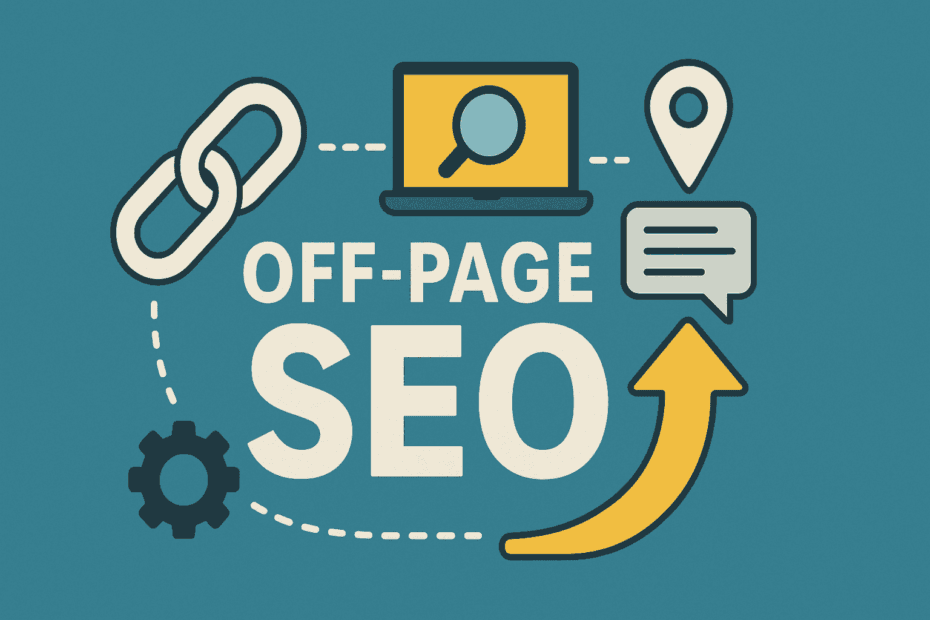If you’ve already worked on On-Page SEO, the next big step in growing your website traffic is Off-Page SEO. Many business owners think SEO is just about adding keywords to content, but Google looks far beyond your website.
Off-Page SEO is all about establishing trust, authority, and popularity on the web. The more signals you establish off your website—through backlinks, mentions, directory listings, and brand mentions—the stronger Google considers you a credible source.
We usually describe it in this way:
On-Page SEO is what you do within your store (product arranging, signboards, and user experience).
Off-Page SEO is how you make people aware of the word away from the shop (reviews, referrals, associations, and reputation).
Both are needed. You can’t win with one and neglect the other.
Why Off-Page SEO Matters?
Google doesn’t only rank pages on content—it also looks to see who else trusts you online. If other high-value sites link to yours, it’s a powerful indication that your content is valuable.
Here’s why Off-Page SEO is important:
Builds domain authority (DA) and page authority (PA)
Improves rankings for competitive keywords
Increases website credibility
Assists in lead generation by driving targeted traffic
Complements your content marketing strategy
If you haven’t yet, read our On-Page SEO guide
so that your site is solid before investing heavily in Off-Page SEO.
Key Off-Page SEO Factors You Should Pay Attention To
- Backlinks (Quality Over Quantity)
Backlinks are the foundation of Off-Page SEO. One good backlink from a trusted site (say, a well-known industry blog) can be stronger than 100 of low-quality links.
However, not all backlinks are the same—relevance, trust, and authority count to Google. Target:
Guest blogging
Influencer collaborations
Content creation that others will want to link to
This is where content marketing and keyword research converge.
- Domain Authority & Page Authority
Two significant metrics developed by Moz are Domain Authority (DA) and Page Authority (PA). Both these scores (1-100) indicate how well a website or an individual page will rank on search engines.
Domain Authority → overall health of your whole website
Page Authority → ranking ability of an individual web page
Increasing DA and PA needs ongoing Off-Page SEO, quality backlinks, and low bounce rates.
- Bounce Rate & User Engagement
Google is testing whether your site really benefits users or not. If people bounce off within seconds (high bouncer rate), it indicates poor user experience.
Off-Page SEO too performs best when paired with On-Page SEO checklist practices such as speedy loading, mobile usability, and good content.
- Business Listings & Local SEO
If you have a local business, Off-Page SEO also entails appearing on business listing sites and local listing sites.
Examples are:
Google Business Profile
Yelp
Justdial
IndiaMart
Local directories
Accurate and consistent NAP (Name, Address, Phone Number) on these platforms enhances your local rankings.
- Social Bookmarking Sites
Publishing your content on social bookmarking websites such as Reddit, Mix, or Flipboard may assist you in driving referral traffic and increasing brand visibility. Although they’re less impactful than backlinks, they still play a role in visibility.
- Social Media Signals
Activity on sites such as Facebook, Instagram, LinkedIn, and Twitter (X) may not directly increase rankings but increases your exposure. Viral posts tend to earn natural backlinks, which translates to direct SEO improvement.
- Forums, Q&A, and Communities
Being active in forums such as Quora, Reddit, or specialized communities contributes to brand building. Giving real answers (and not spamming) makes you an expert, effectively indirectly assisting your SEO.
Off-Page SEO vs On-Page SEO
On-Page SEO = everything within your site (titles, meta tags, keywords, content, UX)
Off-Page SEO = everything external to your site (backlinks, listings, mentions, shares, authority)
See our On-Page SEO Checklist
to make sure your basis is good before attempting to build authority outside.
Best Practices for Good Off-Page SEO
Strive for quality backlinks from applicable sites
Enhance your domain authority through trust signals
Maintain NAP information identical in all business citations
Publish content actively on social bookmarking platforms
Develop content that naturally minimizes bounce rate
Participate in guest posts, podcasts, and PR mentions
Monitor backlinks periodically and delete spammy links
Final Thoughts
Off-Page SEO is all about building an online reputation. If others speak positively about your company online, link to your pages, and share your brand, Google will pick up on it.
But don’t forget—it works best when paired with great On-Page SEO and a defined digital marketing plan. In combination, they fuel long-term growth, traffic, and lead generation.
To maximize your SEO experience, also investigate:
SEO Freelancer
– for professional help in implementation
Content Marketing
– to make content that people love to link to
Keyword Research
– in order to reach the right people
Lead Generation
– to convert traffic into paying consumers

